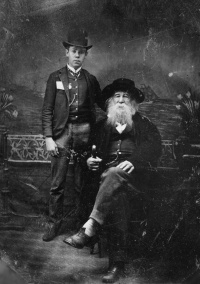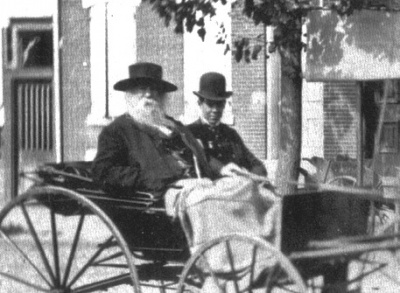Walt Whitman

Ohio Wesleyan University, Bayley Collection.
Walt Whitman (May 31, 1819 – March 26, 1892) was an American poet, essayist and journalist. Born on Long Island, Whitman worked as a journalist, a teacher, a government clerk, and—in addition to publishing his poetry—was a volunteer nurse during the American Civil War. His work was very controversial in its time, particularly his poetry collection Leaves of Grass, which was described as obscene for its overt sexuality. [1] Though Whitmen was not pederastic in the classical sense, it appears that he had sexual relationships with both men and boys and perhaps women as well. In 1841, Whitman was allegedly tared and feathered and rode him out of town on a rail due to reports that he was having sexual relationships with one or more of his male students in Southold, N.Y. [2]
Walt Whitman and Bill Duckett

In 1884 when Whitman was 65 years old, he bought a house at 328 Mickle Street in Camden, New Jersey. Bill Duckett was a neighbor boy who lived three doors down and was somewhere between twelve and fifteen at the time. [3] The two may have met while playing quoits and as Duckett latter recalled: "We boys had a quoit club, and W. made us a present of a handsome set of quoits for pitching." Soon after, he moved in with Whitman and the two lived together for about five years. They were nearly inseparable in 1885, particularly after September 15, when Whitman's friends bought him a horse and buggy. The poet wrote in his notebook in November 1885, "go out in wagon every afternoon ~ Wm Duckett drives." [3] Walt and Bill seemed to have been very happy together for several years. Bill accompanied him to his various engagements and acted as his driver and assistant. However over time, their relationship grew more turbulent particularly because Bill failed to live up to Whitman's expectations for him.
Bill Duckett's relationship with Whitman appears to have been somewhat opportunistic and that the young man took advantage of Whitman's love and generosity. Whitman himself sometimes described Bill as a "rascal" and a "scamp". Whitman later recalled that, "we were quite thick then: thick: when I had money it was as freely Bill's as my own. I paid him well for all he did for me."
In Charley Shively's article, "WALT WHITMAN and BILL DUCKETT: MAN/BOY LOVERS" , he writes:
"Possessions seem to have been at the heart of the falling out between Whitman and Duckett. In April 1889, Whitman was looking for some printed photos of himself; there had only been 250 to begin with; Whitman thought there had been 305. A rival suggested Bill might have taken them, and Whitman went off in a tirade: "I must not say who ~ only that they are probably stolen. I have had many things purloined, stolen, from the rooms here ~ books, pamphlets, papers, clothing, pictures. I had fully six or seven pairs of gloves ~ choice gloves given to me ~ gloves of some value; attractive, too, evidently to others. I had also half a dozen handkerchiefs, presents, some of them silk; choice, fine, beautiful; they are gone, too. Some of these things were souvenirs, some not." But he had to admit, "I am a great forgetter, mislayer: I hesitate to explain the missing things this way till all other explanations are exhausted" (With Walt Whitman in Camden, 5:82). Bill was living with Walt Whitman until forced to leave. When he gathered his belongings, they would have necessarily fallen together with his mentor's in their times together. Whose handkerchief was whose? Whitman himself had said that they shared everything." [3]
It may well be that those in Whitman's inner-circle saw Bill's relationship with Whitman as being parasitic or more likely at odds with their own avaristic desires. Mary Oakes Davis (Whitman's housekeeper) seems to have played a significant role in keeping the two apart as Whitman's health declined. "When the boy came to call on Mickle Street, he was not allowed to get to the poet's bedroom on the second floor." [3] After Whitman's death, she later sued both Whitman's estate and Bill Duckett winning cash settlements in both cases.
To his credit, Bill later said of Walt: "He always gave me good advice and help, and was the best friend I ever had."
- Note: In 1889, Bill Duckett may have posed nude for a series by photographer Thomas Eakins. [4] [5] [6] [7] [8]
Works
- Franklin Evans (1842)
- Leaves of Grass (1855)
- Drum-Taps (1865)
- Memoranda During the War
- Specimen Days
- Democratic Vistas (1871)
References
- ↑ http://en.wikipedia.org/wiki/Walt_Whitman
- ↑ http://www.nambla.org/whitewash.html Whitewashing Whitman by Charley Shively
- ↑ 3.0 3.1 3.2 3.3 http://www.nambla.org/whitman.html WALT WHITMAN and BILL DUCKETT: MAN/BOY LOVERS by Charley Shively
- ↑ http://andrejkoymasky.com/liv/fam/biod3/ducket01.html
- ↑ http://www.pafa.org/museum/The-Collection-Greenfield-American-Art-Resource/Tour-the-Collection/Category/Collection-Detail/985/mkey--753/nameid--173/pageindex--2/sort57--3_3a22-/ Bill Duckett nude, lying on stomach, holding vase
- ↑ http://www.pafa.org/museum/The-Collection-Greenfield-American-Art-Resource/Tour-the-Collection/Category/Collection-Detail/985/mkey--768/pageindex--18/ Bill Duckett nude, reclining on side, hand on knee
- ↑ http://www.pafa.org/museum/The-Collection-Greenfield-American-Art-Resource/Tour-the-Collection/Category/Collection-Detail/985/mkey--761/pageindex--18/ Bill Duckett nude, leaning against chair, from rear
- ↑ http://www.pafa.org/museum/The-Collection-Greenfield-American-Art-Resource/Tour-the-Collection/Category/Collection-Detail/985/let--E/mkey--764/nameid--173/pageindex--14/ Bill Duckett nude, sitting on chair
Other references
Shively, Charley Calamus Lovers: Walt Whitman's Working Class Camerados, Gay Sunshine Press, San Francisco, 1987: 25. ISBN 978-0-917342-18-9
Keller, Elizabeth Leavitt. Walt. Whitman in Mickle Street. New York, 1921.
Leyland, Winston, ed. Gay Sunshine Interviews, vol.1. San Francisco, 1978.
Traubel, Horace. With Walt Whitman in Camden, vol 4, January 2l -April 7, 1888, ed. Sculley Bradley. Philadelphia, 1953. Vol 5, April 8 - September 15, 1888, ed. Gertrude Traubel. Carbondale IL, 1964; Vol 6, 15 September 1889 - 6 July 1890, ed. Gertrude Traubel and William White. Carbondale IL, 1982.
Traubel, Horace, Richard Maurice Bucke, and Thomas B. Harned, eds.,In Re Walt Whitman. Philadelphia, 1893.
White, William. "Billy Duckett: Whitman Rogue". American Book Collector 21 (Feb. 1971): 20-23.
Whitman, Walt. The Correspondence, 6 vols, ed. Edwin Haviland Miller. New York, 1961-1977.
--. Daybooks and Notebooks, 3 vols, ed. William White. New York, 1978.
--. Notebooks and Unpublished Prose Manuscripts, 6 vols, ed. Edward F. Grier. New York, 1984.
